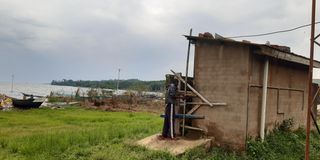Officials close landing sites without latrines

A man tries to access a pit latrine which was closed at Ssemawundo Landing Site in Kalangala District on Tuesday. PHOTO BY SYLVESTER SSEMUGENYI.
What you need to know:
This follows reports that several islanders answer the call of nature in buckets and later dump the waste in the lake
Leaders in Kalangala District have started shutting down all landing sites without functional public toilets.
This follows reports that several islanders answer the call of nature in a bucket and later dump the waste in the lake.
Ssemawundo Landing Site was the first to be closed on Sunday last week after residents failed to maintain the only available pit-latrine in the area.
In an interview with Daily Monitor on Monday, Mr David Nyanzi Kizito, the chairperson of Semawundo Landing Site, said: “The landing site will remain closed until residents accept to collect money for cleaning the pit-latrine.”
Mr Godfrey Adubi, the district health inspector, said a lot of sensitisation has been done but islanders have failed to observe recommended hygiene standards.
A 2019 district survey revealed that four out of the 64 inhabited islands in Kalangala District have toilets. The islands include Bugala, Bukasa, Buyovu and Serinya, where residents own both public and private pit-latrines.
However, residents on the other 60 islands dispose of human waste in the bushes and other established places, locally known as “Twatwa”, which human waste is later swept into the lake by rain.
The Kalangala District chairperson, Mr Rajab Ssemakula, said the district does not have money to construct pit-latrines at the moment.
“We advise the public to mobilise funds and construct pit-latrines for themselves,” he said.
According to the Uganda Bureau of Statistics (UBOS) estimates for 2020, Kalangala has a population of 72,000 people and more than 80 percent of the residents lack access to proper lavatory services, which contributes to the ever-increasing number of waterborne diseases such as bilharzia and diarrhoea.
Information at Kalangala Health Centre IV indicates that there is an increase in diarrhoea cases among children below 10 years from 20 cases recorded last year to about 46 cases.
The United Nations Children’s Fund (Unicef) states that poor sanitation, including open defecation, leads to the spread of communicable diseases, which are costly to treat.
Diarrhoea alone, the agency states, kills 33 children in Uganda every day.
The national average toilet coverage stands at only 68 percent, according to the UN. This means that almost seven homes out of every 10 lack pit-latrines.
A World Bank Water Sanitation programme report released in 2012 indicates that poor sanitation costs the country at least Shs389 billion annually or 1.1 percent of the national Gross Domestic Product (GDP).
It manifests in open defecation and the World Bank says eliminating the practice would necessitate the construction of not less than 650,000 pit-latrines.
It pointed out that open defecation alone costs Uganda $41 million (about Shs157b).




